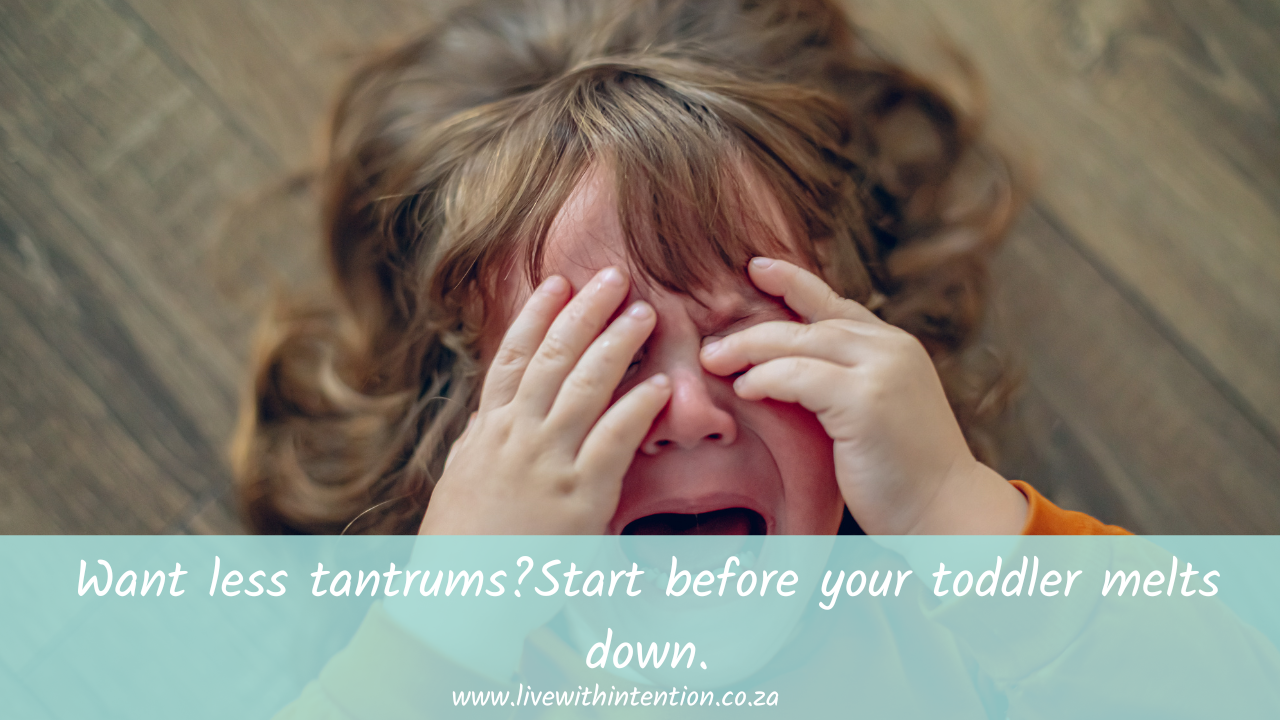
As a mom to 4, I've spents some years in the trenches of toddler tantrums. I've learnt that while it's impossible to completely eliminate tantrums, it is possible to mitigate them so you deal with them less often. Here's how:
Manage your toddler's emotional and physical state.
Did you every play the SIMS computer game?
In that game you were in charge of a character and had to manage their life. You needed to make sure you fed your character, that they had enough sleep, enough entertainment, enough intellectual stimulation, enough socialisation AND also make sure they didn't have too much socialisation, to much intellectual stimulation etc. If you didn't manage your character properly, he/she would get into a bad mood and wouldn't want to do anything.
I feel like this game (that I sometimes played in my teens) was probably one of the best preparations for parenting!
When it comes to toddlers (or all humans, actually), our emotions are hardest to regulate when we are tired, hungry, overstimulated or uncomfortable.
If you can manage your life to stay on top of your toddler's naps, diapers, mealtimes and physical stimulation, you'll manage to reduce tantrums.
Teach your toddler sign language.
Not being able to make yourself understood is something that would frustrate anyone. When it comes to toddlers, that frustration can often result in a tantrum.
We taught all four of our children some basic sign language by the age of around 10 months. You can start earlier (or later). Our basics were: milk, eat, drink, sleep, mom, dad, water, Allah, diaper, poo, hot (to indicate heaters), danger, please, thank you.
I found that, especially for younger toddlers who aren't talking yet, even these basics allows them some form of communication which decreases frustration (and tantrums).
Create rhythms and routines for daily life.
Transitioning between activities is a common time for tantrums to occur. Routines or rhythms (less structured than routines but rather a daily flow) can help your toddler have realistic expectations of their day and reduce the likelihood of tantrums.
Our daily rythym includes outdoor time every afternoon. My toddler sometimes asks to go outside earlier in the day but he understands (even if he grumbles a bit) that even if I say no, outdoor time will come. He now often asks "is it afternoon yet?" when he wants to go outdoors.
Tell your toddler stories
When there are special events happening, or you know that you're going to be out of routine, tell your toddler a story of what is going to happen. This comes back to realistic expectations - your story will help him/her to have an idea of what the day/journey is going to be like.
We talk to our toddler about where we're going to go, what we will eat, who we will meet, and if they're expected to greet family or sit in a car for a while. We emphasise the fun bits but never leave out the unpleasant/boring bits.
WHEN TANTRUMS DO HAPPEN
Even when you do everything right, there are still going to be times when you get tantrums - it's a normal stage of development for your child.
So when tantrums do happen:
- Regulate yourself (so you can react calmly).
- Try to understand the underlying cause so you can act appropriately (do they need to be fed, changed, taken somewhere quiet, put to sleep?).
- Hold boundaries if neccessary. Sometimes a toddler is protesting that they can't do something dangerous ( for example touch a heater) or something non-negotiable (for example, sitting in a car seat). In these cases I tell my child "I know you're sad about this, and it's okay to be sad. Unfortunately we all have to do things we don't like sometimes." It's okay to let them cry in these kinds of situations - it is also important for their development to learn that there are boundaries (and although they push them, boundaries also something that help children, even teens, feel safe).
- Give empathy. Hug or hold your child if they want to be touched. Deep pressure can help regulate emotions. Give them space if that is what they want. Help verbalise their emotions for them ("you're feeling sad because your granny has to leave"; "you're angry because you want to use your brother's toy but he is busy with it").
- Distract. Sometimes, a distraction is all a toddler needs to move on from a tantrum. A new activity or toy, something to look at.
- If they are angry, you can start to teach them sunnah ways of regulating anger (which can also serve as a distraction) - make wudhu together, say "aaoothobillah", drink some water, sit or lie down.
Lastly, remember that it is okay for your little human to feel big emotions. Our job is not to stop that from happening, rather to help them.
Join us on the road to living with intention by taking one of our courses!
Stay connected with news and updates!
Join our mailing list to receive the latest news and updates.
Don't worry, your information will not be shared.
We hate SPAM. We will never sell your information, for any reason.

